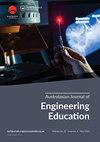工科学生的非认知与情感因素:聚类分析的群体差异
Q1 Social Sciences
引用次数: 4
摘要
非认知和情感(NCA)因素(如归属感、工程身份、动机、心态、个性等)对本科生的成功很重要。然而,很少有研究考虑到这些因素是如何共存并协同作用的。本文章由计算机程序翻译,如有差异,请以英文原文为准。
Engineering students' noncognitive and affective factors: Group differences from cluster analysis
Noncognitive and affective (NCA) factors (e.g., belonging, engineering identity, motivation, mindset, personality, etc.) are important to undergraduate student success. However, few studies have considered how these factors coexist and act in concert.
求助全文
通过发布文献求助,成功后即可免费获取论文全文。
去求助
来源期刊

Australasian Journal of Engineering Education
Social Sciences-Education
CiteScore
6.40
自引率
0.00%
发文量
8
 求助内容:
求助内容: 应助结果提醒方式:
应助结果提醒方式:


